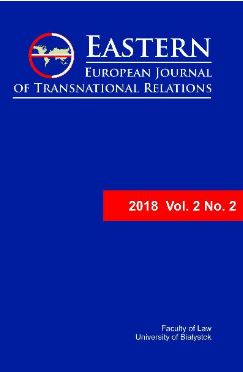ECJ´s New Role – Guardian of Open but not Socially Inclusive Europe?
ECJ´s New Role – Guardian of Open but not Socially Inclusive Europe?
Author(s): Magdaléna Svobodová, Václav ŠmejkalSubject(s): Law, Constitution, Jurisprudence, International Law, EU-Legislation
Published by: Temida 2
Keywords: Court of Justice of the European Union; welfare tourism; access to social assistance; third country nationals; family members; right of residence; Directive 2004/38; Brexit
Summary/Abstract: The aim of the following article is to find whether the European Court of Justice has reacted in its recent rulings to the growing reluctance of many Europeans and their political representations towards quasi-automatic rights of migrating of European Union citizens to move to another Member State and enjoy there the benefits of social policy on equal footing with this country´s nationals. The result of the referendum held in the United Kingdom on 23 June 2016 regarding the UK’s membership in the EU demonstrates the importance of the issue in question. The authors analyse recent case law of the European Court of Justice in comparison with its earlier case law regarding the access of Union citizens to social assistance and the status of third country nationals as family members of European Union citizens. The authors have come to the conclusion that so far, the European Court of Justice tightened the interpretation of the European Union law in force in the area of welfare tourists’ rights unlike in the case of economically active migrants. First, Martinez-Sala, Grzelczyk, Bidar, Trojani and other judgments are mentioned to remind the previous approach of the European Court of Justice, based on the principle of broad solidarity between Member States. Second, this approach is confronted with more recent case law, i. e. Dano, Alimanovic, Garcia-Nieto, Commission against the United Kingdom. In those cases, the court did not require the host Member States to recognize the value of EU citizenship as an individual's “fundamental status” nor to show a degree of solidarity. The court stood for the uncomplicated and rigorous application of Directive 2004/38. When it comes to third country nationals as family members of Union citizens, their status it is not only confirmed but even extended. The authors analyse briefly earlier case law of the European Court of Justice, namely the Singh, O. and B., Metock, Zambrano and Dereci cases. These judgments are characteristic of broad interpretation of Directive 2004/38 and provisions of the Treaty on EU citizenship in favour of the family members. Protection of fundamental rights also plays an important part. Other than in the case of social tourism, there has been no change in the approach of the European Court of Justice. On the contrary, in Marín, Chavez-Vilchez, Lounes or Coman judgments, the European Court of Justice confirms its previous line of reasoning and further develops it. Nevertheless, the authors hold the view that the European Court of Justice should more carefully balance and try to reconcile free movement rights, fundamental rights, as well as the sovereign rights of Member States in order to contribute to the prevention of European disintegration.
Journal: Eastern European Journal of Transnational Relations
- Issue Year: 2/2018
- Issue No: 2
- Page Range: 11-32
- Page Count: 22
- Language: English

